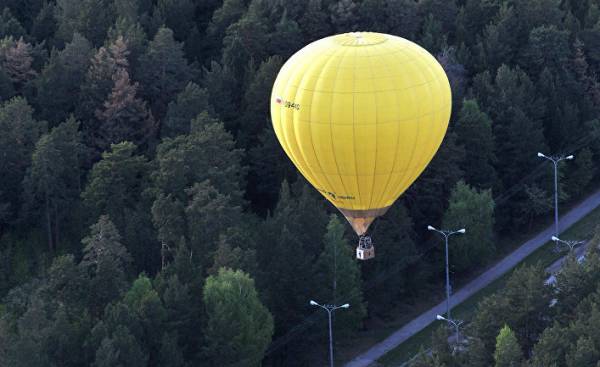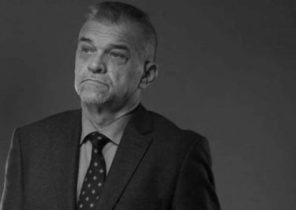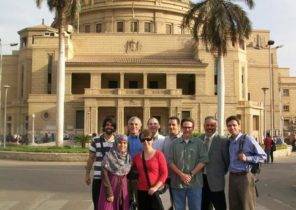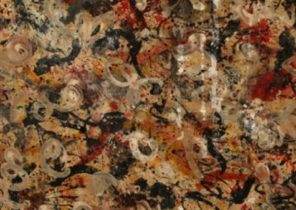
Gazeta Wyborcza: How you got idea to describe Russia through the prism of a provincial theatre?
Song arrangements were done by Jacek (Jacek Matecki): What is Russia, all the world’s a stage, wrote Shakespeare. I decided to see if he’s right. But seriously, I wandered in Russia and decided it was time to stop, to look at it from a different perspective. I occur to different places, for example, the lighthouse in the Chukchi provinces, but it turned out that it was a border area, so foreigners there do not favor: what if they start snooping around. In the forest I have lived, the fish in the sea of Okhotsk were caught, in an Orthodox monastery I visited, so by process of elimination it turned out the theater. But Moscow or Petersburg are more suitable for celebrities, than for people, so I chose the province because you can see everything better. I sent letters to a dozen theaters, writing that I am a pole, a writer and would like for them to come. I was invited to a theatre in the Urals. They did not believe that I will, but after a month and a half I was there. By the way, in local repertoire is “King Lear”.
— The idea of the book seems rather static, but reading is exciting, perhaps because, like Shakespeare, everything is filled with content.
— In the theater goes a little more than 10% of people, they bring out something that you have no idea those who have not been there. It is the merit of the topic, not my skills. Do you remember what hamlet said to Polonius? “If you take each on merit, who will escape the whip?”
— How long was your theatre experience?
— My first book about wanderings in Russia was a success and I’m proud, decided that it was possible to step twice into the same river. It turned out that all is not so simple. I arrived in Kamensk-Uralsky in March 2016 and three times spent there almost three months. I sat in one place: no wavering in the city, except, of course, trips to the store for, say, the ingredients for establishing contacts with the artists. My goal endorsed by the publisher, was to describe the inside of the theater: how people live actors, what they think, what dream, what happy, I regret. At the same time, of course, was supposed to be Russia, but the task proved too complex. I turned Polish and Russian Internet and have not found a single report from inside the theatre, from its very womb. I got to thinking about what to write: about the actors, about art, about the repertoire or this unhappy Russia? I’m dealing with this fact, because already in the first day, the theater Director announced to the company that I can do whatever I want. I went to rehearsals, performances, spent time backstage in the dressing rooms, the office of the Director, everywhere. About this and make a book.
— Why this theatre has agreed to open up to the writer?
I don’t know. 11 other theaters, in which I wrote, didn’t even bother to answer me. And here, first, was a great Director, and second… On that second I think. Why Lyudmila Stepanova answered me almost immediately, while others have not given me the answer? Maybe no one writes the stories of the theatres because they carefully guard their secrets? A few of the mysteries I have solved, and here comes the next question: what are the Russian or global theatrical specificity? This I don’t know because never go anywhere, except for Poland and Russia.
— What have you learned about Russia from watching a theatrical rehearsal?
When I was in Kamensk-Uralsky, youth theater Studio prepared for production a novel of the Russian writer Vasilyev “Tomorrow was the war”. Vasiliev was a writer famous movie “the dawns here are quiet…”, but this book in Polish are not translated. It seems to be criticized Stalinism, but it “seems” is the key. Through this statement I realized how different you can look at the story and rewrite it, what a different role she might play in the minds of the people. In this respect, Russia and Poland shared the same distance as Warsaw and Kamchatka. We could never understand each other, I am quite sure, and I write about. However, my book is like the apotheosis of misunderstanding and xenophobia. To observe how people differ in opinions, can’t agree with each other that firmly stand on their positions, very interesting.
— Your previous book was about the journey, the new talks about theater and what will be next?
I found one topic, but I’m definitely not smart enough. I happened to find out about single Russian Buryatia, who was a Buddhist, or rather, lamaita. Fifteen years he spent in the camps, where he died in 1972. It was the Titan of thought and labor. In freedom he did not have housing, so that during the day he read and wrote in the Lenin library, and at night slept at the station. He translated from Sanskrit, Tibetan and even some languages. He fell in love and wrote lover letters about Buddhism. Russian Buddhism is actually an interesting topic. And once in a Catholic Church in Tashkent, I met a pole who studied Islam… Hell, many interesting topics! It is a pity that this world is coming to an end.






